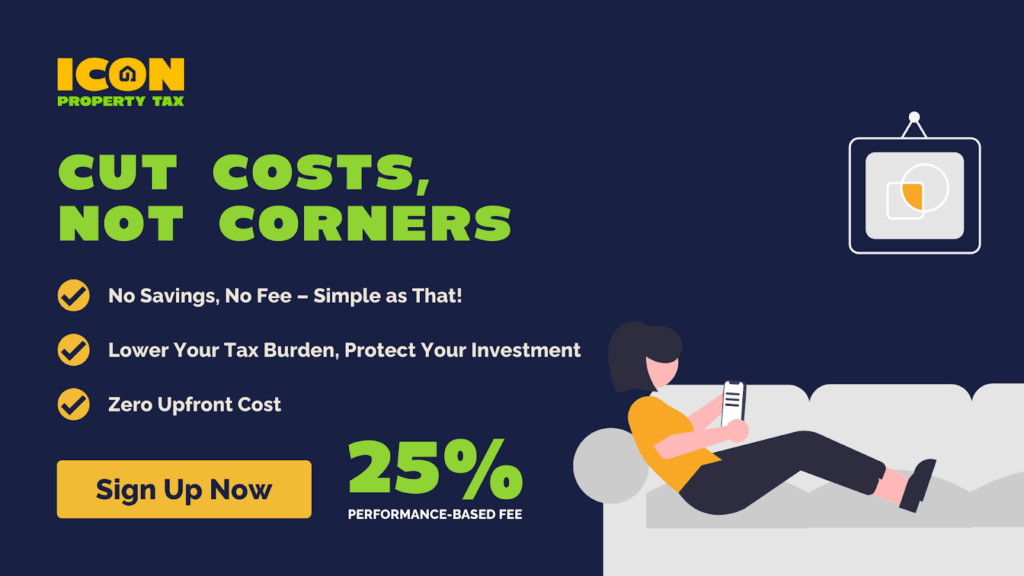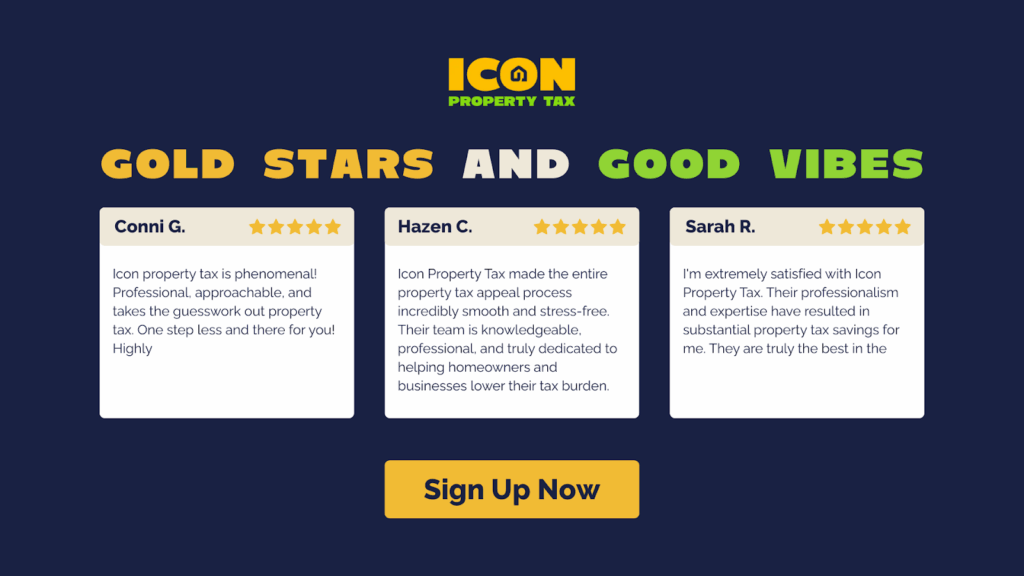How Property Taxes Work And What You Need To Know About Them
August 28, 2025
Key Takeaways:
- Property Tax Fundamentals: Understand the full meaning and purpose of property taxes, including how local governments calculate and apply them.
- Smart Savings Strategies: Learn actionable strategies to reduce your property tax bill legally and efficiently.
- Professional Support Advantage: Discover how professionals like Icon Property Tax can help optimize your tax responsibilities through expert support and appeals.
Our professionals have successfully represented over $45 billion in commercial property and consistently reduced tax burdens across the country. Our deep understanding of how local governments operate gives us unique insight into the systems that drive property taxation—and how those funds are distributed.
Property taxes aren’t just a bill in the mail—they’re a cornerstone of community funding. From schools and emergency services to parks and sanitation, these local taxes fuel the public services that affect daily life. Understanding where your money goes can help you better appreciate the value you’re contributing to your neighborhood and why local governments work hard to collect these funds.
In this piece, we’ll be discussing how property taxes are used and what specific services they support in your community.
What Are Property Taxes?
Property taxes are mandatory payments made by property owners to local governments based on the value of their property. These taxes are typically levied on real estate, which includes land and any buildings or structures on it. Whether you own a single-family home, commercial property, or a vacant plot of land, you are generally subject to property tax.
The main purpose of property tax is to fund indispensable public services such as education, law enforcement, road maintenance, fire departments, and other community resources. Because these services benefit the local area, property taxes are collected and managed by municipalities, counties, or local tax authorities, not the federal government.
The amount you pay is tied to the assessed value of your property, which is determined by a government-appointed assessor. This value is often based on market value, but it may be adjusted according to local laws, exemptions, and property classification.
How Are Property Taxes Calculated?
Property taxes are calculated by multiplying the assessed value of your property by the local property tax rate, which is usually expressed as a percentage or a mill rate (amount per $1,000 of assessed value). The assessed value is determined by your local tax assessor and may reflect the market value or a percentage of it, depending on your state or county laws. Local tax rates are set by various governing bodies, such as city councils or school boards, and often fund fundamental services like public schools, police, fire departments, and infrastructure. Because both assessed value and tax rates can change, your property tax bill may fluctuate from year to year.
Assessed Value
The assessed value is the estimated worth of your property, as determined by a local tax assessor. It often considers factors like recent sales of similar homes, property condition, and market trends.
Tax Rate (Millage Rate)
The tax rate, or millage rate, is expressed in mills, where one mill equals $1 for every $1,000 of assessed value. Local governments set this rate to meet funding needs for services like schools and infrastructure.

Exemptions And Deductions
Many jurisdictions offer exemptions that lower your taxable value, such as homestead or senior exemptions. These deductions can significantly reduce your property tax bill if you qualify.
Example
If your home is assessed at $300,000 and your local tax rate is 25 mills, you would owe $7,500 in property taxes annually. This helps fund services like emergency response, public schools, and parks.
Who Sets Property Tax Rates?
Property tax rates are set by local governing bodies, such as city councils, county commissioners, school boards, and other municipal authorities. These rates are typically reviewed and adjusted annually to align with local budget needs and community priorities.
Each entity, like a school district or fire department, determines the amount of funding it needs and sets its portion of the tax rate accordingly. These individual rates are then combined to form the total millage rate applied to your property.
How Property Taxes Are Used
Property taxes play a vital role in sustaining the important services that keep communities functioning smoothly. These local taxes directly fund a variety of public needs, making sure that residents benefit from well-maintained infrastructure and support systems. Here’s how property taxes are typically used:
Public Education
A large portion of property tax revenue goes to funding public schools, including teacher salaries, school facilities, and educational programs. These taxes help guarantee that schools within a community are adequately resourced.
Emergency Services
Local police, fire departments, and EMS rely heavily on property tax funding to operate. The taxes support staffing, training, equipment, and facilities for first responders.
Roads And Infrastructure
Property taxes help maintain and improve roads, bridges, sidewalks, and traffic control systems. This makes certain that safe and accessible transportation for residents.
Public Health And Sanitation
Funds are allocated to sanitation services like trash collection, recycling, and wastewater management. They may also support local health departments and clinics that provide basic healthcare.
Libraries And Parks
Community resources such as libraries, public parks, and recreational centers are often financed by property taxes. These services contribute to residents’ quality of life and community engagement.

What Happens If You Don’t Pay Property Taxes?
Failing to pay your property taxes can lead to serious consequences over time, including penalties, interest charges, and even the risk of losing your home. Local governments depend on property taxes to fund integral services such as schools, emergency responders, public utilities, and road maintenance. Because this revenue is so important, most municipalities have strict systems in place to enforce payment. If taxes remain unpaid, the local government may place a lien on your property, which can eventually result in a tax sale or foreclosure. Staying current on your property tax bill helps you avoid these costly and stressful outcomes.
Penalties And Interest
Unpaid property taxes typically begin to accrue penalties and interest shortly after the due date. These additional charges increase your total debt and can quickly become burdensome.
Tax Liens
If taxes remain unpaid, the local government may place a lien on your property. A tax lien gives the government a legal claim over your property until the debt is resolved.
Tax Sale Or Foreclosure
In some cases, your property may be auctioned off through a tax sale to recover the unpaid taxes. If the situation continues, it can even result in foreclosure and loss of the property.
How To Lower Your Property Tax Bill
While property taxes are unavoidable, there are several strategies homeowners can use to reduce what they owe. Understanding these options can lead to meaningful savings over time.
Apply For Exemptions
Many jurisdictions offer exemptions like homestead, senior citizen, veteran, or disability exemptions. These can reduce the taxable value of your home, resulting in a lower tax bill.
Review Your Property Assessment
Mistakes in your property’s assessed value can lead to overpayment. Review your assessment notice and challenge it if you believe your property has been overvalued.
Limit Costly Improvements
Major renovations can increase your property’s assessed value. Before making upgrades, consider how they might impact your tax obligations.
Work With A Tax Professional
Firms like Icon specialize in helping property owners lower their tax burdens. They can handle appeals, exemptions, and assessments more effectively than most individuals can on their own.
The Role Of Professionals Like Icon In Managing Property Taxes
Managing property taxes can be complicated, especially when dealing with assessments, appeals, and exemptions. That’s where property tax professionals come in.
Assessment Reviews And Appeals
Firms like Icon help clients review their property assessments for accuracy. If they find the value is inflated, they can file appeals to reduce the tax burden.
Maximizing Exemptions
Tax professionals make certain that you’re taking advantage of every exemption available to you. This is especially helpful for commercial property owners with multiple holdings and varied classifications.
Professional Negotiation And Representation
Experienced firms represent property owners in negotiations with local tax authorities. Their knowledge of tax laws, valuation methods, and regional trends can lead to more favorable outcomes than going it alone.

Final Thoughts
Property taxes play an integral role in funding the services and infrastructure that keep communities functioning and thriving. While they’re a recurring expense for property owners, understanding how they work can make managing them less daunting.
By staying informed about assessments, exemptions, and payment options, you can avoid surprises and even reduce your tax liability. And when the process gets too complicated, turning to professionals like Icon can offer peace of mind and real savings.
Frequently Asked Questions About How Property Taxes Work
What is the difference between assessed value and market value?
The assessed value is used by your local tax authority to determine your property tax bill, while the market value is the price your property would likely sell for in the current real estate market. Assessed value is typically a percentage of the market value and can vary depending on local laws.
Are property taxes the same in every state?
No, property taxes vary widely from state to state, and even between counties or cities. Different areas have different rates, assessment rules, and available exemptions based on local funding needs and policies.
Do renters pay property taxes?
Renters don’t pay property taxes directly, but landlords usually factor their property tax expenses into rent. So while tenants aren’t billed for property tax, they may still bear the cost indirectly.
Can property taxes go down if property values drop?
Yes, if your local government reassesses your property and determines that its value has decreased, your property tax bill could go down. However, not all jurisdictions reassess annually, so the impact may not be immediate.
Can property tax be deducted from federal income taxes?
Yes, homeowners may be able to deduct property taxes on their federal income tax returns if they itemize deductions. However, the deduction is subject to a cap under current U.S. tax law.
How often are property taxes billed?
This depends on your location. Some areas bill annually, while others send bills semi-annually or quarterly. Always check with your local tax office for billing schedules.
What is a tax abatement, and how does it affect property taxes?
A tax abatement is a temporary reduction or elimination of property taxes, often offered as an incentive for development or renovation. It can significantly lower your property tax bill for a set number of years.
Is property tax applicable to inherited property?
Yes, inherited property is still subject to property tax. However, the new owner may qualify for exemptions or different assessment rules depending on local regulations.
What happens if I buy a property with outstanding property taxes?
You may inherit responsibility for unpaid property taxes when you purchase the property, especially if they are not settled during closing. It’s imperative to verify this with your title company and local tax office.
Can I pay my property taxes with a credit card?
Many local governments allow property tax payments by credit card, but they may charge a convenience fee. Check with your local tax collector’s office for available payment options.

